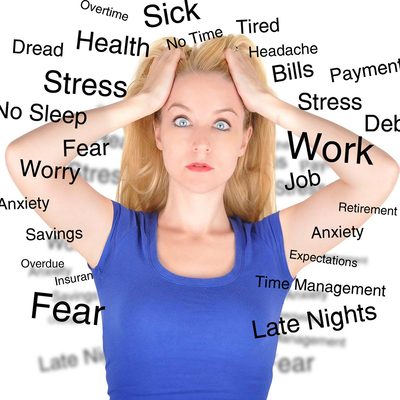Are you constantly feeling dragged down by fatigue? Do you come home after work intent on getting to the gym only to find yourself crawling to the couch and deciding it’s a better idea is to just stay put?
If being tired all the time is really putting a damper on your life, it's time you look at what you can do to regain the energy to enjoy life again. Many people, when assessing states of fatigue turn to factors such as their sleep, their nutrition, or how much they’re exercising. While these can certainly all play a big role in how tired you feel on a day to day basis, they aren’t the only things that will factor in. Stress is another big fatigue building factor that often goes overlooked.
Let’s look at the physiological and psychological consequences of stress and how this may be robbing you of the joy you could otherwise be experiencing in your life.
Stress & Physiology
First, let’s consider how stress is impacting your physiological state. Whenever you’re highly stressed, your body releases a hormone called cortisol, which is the ‘fight or flight’ hormone. Essentially, this hormone prepares your body for battle - it’s the human body’s basic survival mechanism, giving us the energy to run as fast as possible away from danger to safety.
This is great news if you’re being chased by a bear or tiger, but not so great news if you’re just stressing about work building up, a fight you had with your significant other, or how you’re going to pay your credit card bill this week.
Daily stress is a big problem. Your body is built to handle occasional or infrequent stress, but when stress becomes chronic, your physiology actually changes.
The hormone Cortisol drains us. It keeps us in that very active, highly alert state that will slowly but surely wear us out and lead to serious fatigue. When stress further increases, your body releases another reactive hormone called adrenaline. The human body simply can’t sustain being in ‘reactive mode’ for such extended periods. Unfortunately, if you are suffering from chronic, prolonged stress, this is exactly what you’re putting your body through.
To make matters worse, stress can also alter your appetite. Most people will find they feel hungrier when stressed and more likely to turn to carbohydrates. This is actually a natural reaction because carbohydrates cause the release of serotonin, a neurotransmitter in the brain that works to put the body into a calmer state. The drawback, however, is that all those carbs can make us very sleepy and fatigued.
Some people, on the other hand, go the opposite way and choose not to eat when stressed. As a result, they don't consume the required calories their bodies need to support them through the day, in turn leading to serious fatigue.
Stress & Psychology
Next up you need to consider the psychological consequences of stress. Many people tend to view the mind and body as two separate entities, but this isn’t the case. What goes on in your mind affects your body, whether you like it or not.
When you’re stressed out and unable to relax, you’re thinking through everything at once. Whether it’s anxiety, fear, or something else that you’re feeling, you’re cognitively in a very worked up state. It’s like your brain is running a marathon.
This can leave you feeling mentally drained, which then, of course, makes us feel physically drained and fatigued. If you’ve ever experienced a very stressful time in your life – a time when you had something going on at work for instance that was always on your mind, chances are you will be able to recall feeling tension headaches by the end of the day and just wanting to go to sleep. You felt exhausted!
This illustrates how the psychological can impact the physiological. Now imagine that stressful work situation lasting every single day of every week. You would never get a break and you’ll constantly be feeling that tension in your mind and that run-down sensation through your body.
This is definitely not good for helping you better manage physical fatigue.
How to Overcome Stress-Related Fatigue
So what can you do about all this? Is there a viable solution?
The best way to manage your fatigue is to start practising good stress controlling techniques. This may be things such as:
- Daily meditation.
- Get yourself a massage – it’s been used for thousands of years as a stress reliever.
- Try some natural remedies to help keep you calm, such as Organic Stress Soother Essential Oil Blend, Honey Lavender Stress Relief Herbal Tea or some Rescue Remedy Drops.
- Go for a brisk walk – it won’t take too much to get motivated for this, and even this level of activity can really help combat stress.
- Socialising with friends or family.
- Speaking to a counsellor or someone close about whatever it is that’s stressing you.
- Putting things into perspective – just how important is whatever you are stressing about in the grand scheme of things?
You have to figure out what works for you to combat your daily stress levels, as no two people are exactly alike. Once you do figure it out though and put mechanisms in place to handle your stress, you should notice that your physical energy levels will start to improve. It may take a week or two for your body to regain that lost energy after feeling so drained, but make no mistake, it will happen.
So make sure you aren’t overlooking stress as the cause of why you feel tired all the time. Having said that, you most definitely need to get your diet, sleep, and exercise/activity in order, especially if you’re not getting the nutritional requirements your body needs, but in all this, you shouldn’t dismiss or overlook stress as a culprit and contributing factor to fatigue.
...and remember, qualified nutritionists at Healthy Being are available to offer further general advice to help guide you in selecting the right products. So please, feel free to contact us at any time!
.png) Shannon Clark is a qualified nutritionist and a regular contributor to Healthy Being Insights. She specialises in weight control and management as well as optimal fitness performance. She's devoted to helping readers obtain their own personal best health and fitness and stays on top the latest trends in the industry.
Shannon Clark is a qualified nutritionist and a regular contributor to Healthy Being Insights. She specialises in weight control and management as well as optimal fitness performance. She's devoted to helping readers obtain their own personal best health and fitness and stays on top the latest trends in the industry.


 Certified Organic
Certified Organic Vegan Friendly
Vegan Friendly  Vegetarian
Vegetarian Organic Ingredients
Organic Ingredients Dairy Free
Dairy Free Gluten Free
Gluten Free Keto Friendly
Keto Friendly






























